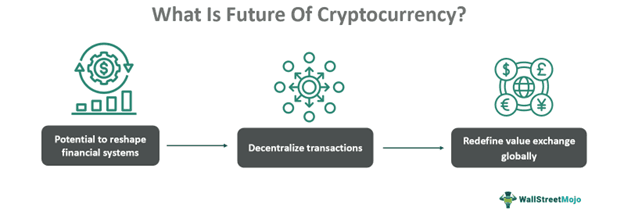Table of Contents
What Is The Future Of Cryptocurrency?
The future of cryptocurrency refers to the potential application of crypto tokens or currency in various sectors for the upcoming years or decades. The main aim of this concept is to determine the consequences that support the use of crypto assets and their currency all around the globe.

Cryptocurrencies have existed since 2009, dating to the launch of Bitcoin. These tokens (coins) serve various purposes for online transactions. In addition, they act as a financial instrument or a stored value for the investor's portfolio. However, the applicability of cryptocurrencies is restricted in many countries.
Key Takeaways
- The future of cryptocurrency hinges on the adoption and impact of crypto coins and digital tokens on the market.
- Since its inception in 2009, various cryptocurrencies have gained public acceptance, with investors considering them as digital assets for their portfolios.
- Currently, there are thousands of cryptocurrencies in existence, though not all have achieved widespread acceptance or overcome public skepticism.
- Predictions of crypto come from influential figures such as the Chair of the Federal Reserve and the chairman of the SEC,
- alongside technological advancements like the development of C+ charging stations.
Future Of Cryptocurrency Explained
The future of cryptocurrency and blockchain technology has changed its possibilities in recent years. The use of crypto coins and digital assets has increased in various countries. Investors and traders have started viewing crypto as a vital portfolio asset. In addition, many companies have accepted crypto coins as a part of digital payments.
Cryptocurrency represents the pioneering decentralized system characterized by a lack of central control over coin supply. Employing mechanisms such as Proof of Work (PoW) and Proof of Stake (PoS) establishes formidable barriers to replication. Consequently, this enhances the security and integrity of the cryptocurrency market. Moreover, cryptocurrency serves as a reliable and secure means of transaction for individuals. There exist 22,932 distinct crypto coins, collectively shaping the trajectory of the cryptocurrency market's evolution.
Miners can easily mine coins from the process and contribute to the existing supply. As a result, they solve mathematical problems and receive an incentive for doing so. Miners get rewarded in the form of crypto coins. Thus, enthusiasts are encouraged to be inclusive of the future of the crypto-mining market. However, certain restrictions endanger the future of the crypto market.
Although cryptocurrency has various benefits, it incurs huge costs. For example, miners use a lot of electricity, which has a significant impact on the environment—moreover, having no regulatory body results in various volatility and safety issues. In recent times, many crypto firms have filed for bankruptcy and started layoffs. As a result, the future of cryptocurrency in the world is difficult to predict.
Top Cryptocurrency Predictions
Let us look at the top predictions and trends that state the future of the crypto world:
- In September 2022, Jerome Hayden Powell, the chair of the Federal Reserve, stressed the absolute need for cryptocurrency regulation. However, Mr. Powell focused on the development of proper norms and guidelines. Later, legislation was passed that helped with tax evasion.
- The chairman of the SEC (Securities and Exchange Commission), Gary Gensler, called cryptocurrency the "Wild West." Gensler stated the rising risk of crypto frauds and the urgency to enhance the blockchain ecosystem.
- During the 2021 budget, the Indian government passed the "Cryptocurrency and Regulation of Official Digital Currency Bill." According to this act, the RBI (Reserve Bank of India) will issue a crypto coin in the form of digital currency.
- As of 2023, more than 114 nations have accepted cryptocurrency as a part of their economy. They have decided to launch (their own Central Bank Digital Currencies (CBDCs) for the future of crypto and blockchain.
- Some EV charging stations have installed C+ charging booths. They work on blockchain technology and P2P payment systems. Also, vehicle owners can use their electronic wallets to pay using CCHG coins.
- The rise of the metaverse also acts as a contributing factor to crypto. Also, technology giant "Facebook" has changed its name to "Meta," signifying the use of cryptocurrency and NFTs (Non-fungible Tokens).
Examples
Let us look at the examples to explain the concept better.
Example #1
If countries accept cryptocurrency, it will have a vast influence all over the globe. Individuals will use crypto coins like Bitcoin, Ethereum, Litecoin, and others to purchase goods. As a result, paper (or hard) money will exit the market. It will be convenient to transact goods as it works on a POW mechanism. There are certain disadvantages to all this.
As the reliability increases, there will be a need for more crypto coins. However, it depends on the future of crypto mining. If there are enough miners, the supply will stay strong. Also, the need for a centralized system will arise as cyber risks and cryptocurrency usage grow. On the contrary, not having a centralized power will keep the transactions safe from authorized control.
Example #2
In an interview dated April 2023, Ashish Singhal, CEO and founder of CoinSwitch, expressed optimism about the future of cryptocurrency. He acknowledged the challenges faced by the market in the previous year but believes that conditions are gradually improving. Singhal remains optimistic about the market's potential for recovery, indicating a hopeful outlook for the future of crypto.
